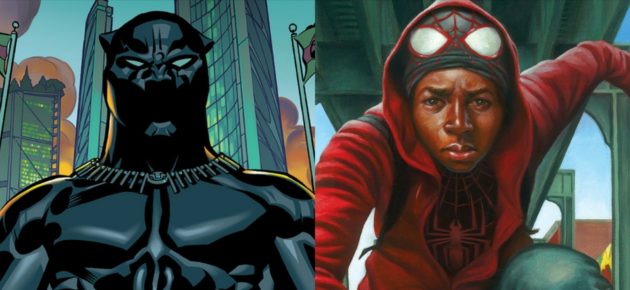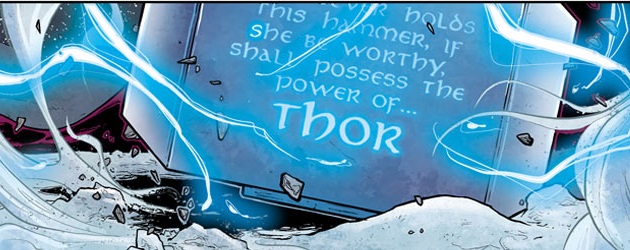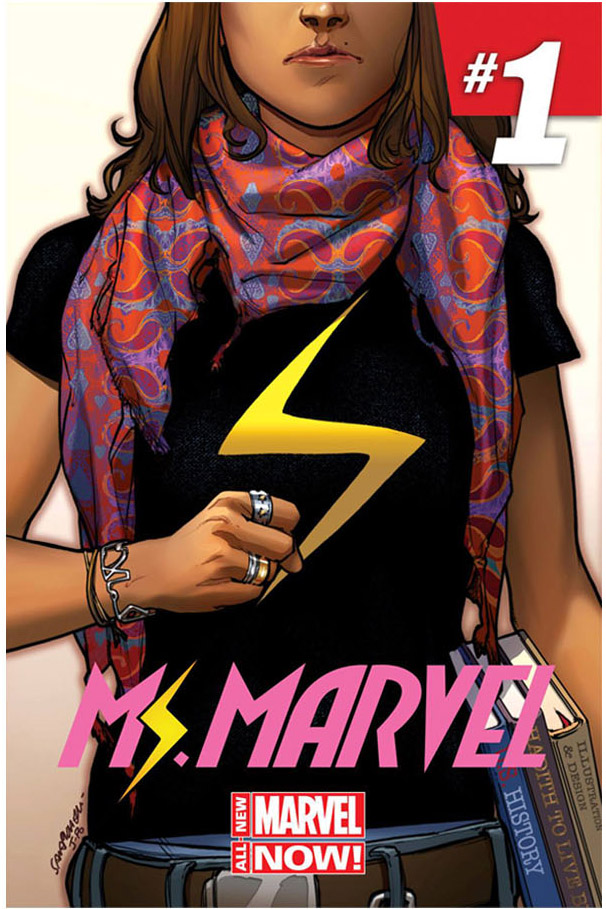Marvel has been in a crisis as of late in regards to its response to diversity of its characters. Push back from retailers and fans on either side of the issue – wanting to either keep the mostly male characters of yesteryear or diversifying the characters and stories in their books has made most marvel events as of late seem like shouting matches. Thankfully there was a reprieve from all the arguments against diversity during New York Comic Con with a sit down converstion between New York Times best-selling author Jason Reynolds (Ghost, Miles Morales: Spider-Man) and National Book Award winner Ta-Nehisi Coates (Black Panther, Between the World and Me). Taking place offsite at Hudson Mercantile, two blocks away from the main hub at the Jacob Javits center, the two authors got a chance to have a quiet discussion about their approach to writing, how they became involved in writing their current book and what it means to be a Black writer in the current time we are in America.
Held on the sixth floor of an airy and empty event space free from most paraphernalia that are the hallmarks of the con – all but the backing banner. The setting is in opposition to the dark subbasement of the conference hall as light streams in through windows throughout the space. The panel is scheduled to start at 12 PM but the time comes and goes but not a grumble or murmur of disgruntlement escapes the lips of those around me. The crowd, however, burst into applause as Coates and Reynolds take their seats to begin with introductions and finding where they want this discussion to go. As they open up in conversion Reynolds as Coates about his start in comics. Coates begins and speaks of how comics shaped his young mind saying its where he “got his literary sensibility” and it “feels natural even though it’s not obvious” in relation to how he is most widely know as journalist and author. Coates recounts how it was like to be a comic book fan before the internet era took hold and having to track books down if you want to follow that continuity of the over arching plots of books. He also later notes that he more than likely got chosen to do the book based on his name as a Author and what kind of name capital that brought attention to the current Black Panther book.

On the flip-side Reynolds had a different journey to his writing the Miles Morales novel. When posed with his own question by Coates Reynolds spoke of how his journey was through his older brother who was a “hard body comic book person”. On a personal level it was all of the side outgrowth from comics with cartoons, video games, action figures and other merchandise. He came on to write his novel on Miles through a call from his agent. At first he was hesitant, thinking Marvel and Disney wanted a Peter Parker story, but once he learned it was to be about Miles he moved to sign on. After his sign on he was brought to the Disney offices for a champagne toast, something Coates notes in a hushed tone he didn’t receive which breaks the out in laughter. Continuing with his story Reynolds finds out that he is being put on the spot to share his ideas about where he wants to take the story in the novel. Not knowing ahead of time what he wanted to do Reynolds says of that moment he started to think about himself. “because in the neighborhoods I grew up in there were no kids in my community that would of been like ‘you son if we had more power, you know what we’d do with it, we’d be more responsible.” Again the crowd erupted in laughter. All this was to say, in Reynolds words, “I wanted to pick at what that means for a kid who wakes up and realizes he has a super power – and you never had it before your expected to manage it, so what don’t we show what it is like to have a super power when you are the only one with one in your community” and in relation to poor communities of color Reynold’s speaks of the feelings of being able to escape your surrounds and coming back and “why don’t we discuss survivors guilt” and “the pathology of inferiority where you don’t believe you deserve to be a superhero” based upon the harsh realities around a person of these communities. Reynolds wants to show what it means to be young and Black and Male in America because he feels we don’t get enough of a range of characterizations.

The conversation then flows to the next topic as Coates picks up “in comics and in pop culture there is a hunger I think among Black fans to just see a Black dude or Black woman just bust some ass.” To Coates this is a need but there has to be more to it. In his work so far on the current Black Panther comic run Coates “kind of went away from the impulse to watch him bust ass.” “I had seen Hudlin’s version kick plenty of ass I had seen, you know Priest was going into it that was his thing you know you gotta respect this dude so I felt like he was respected I felt like I didn’t have to establish that he wasn’t a joke in a way that Christopher Priest has established this dude he ain’t no punk, but I felt like everybody knew that by now, you know what I mean he was cool everybody felt like he wasn’t no punk so I felt free to engage other aspects of him.”
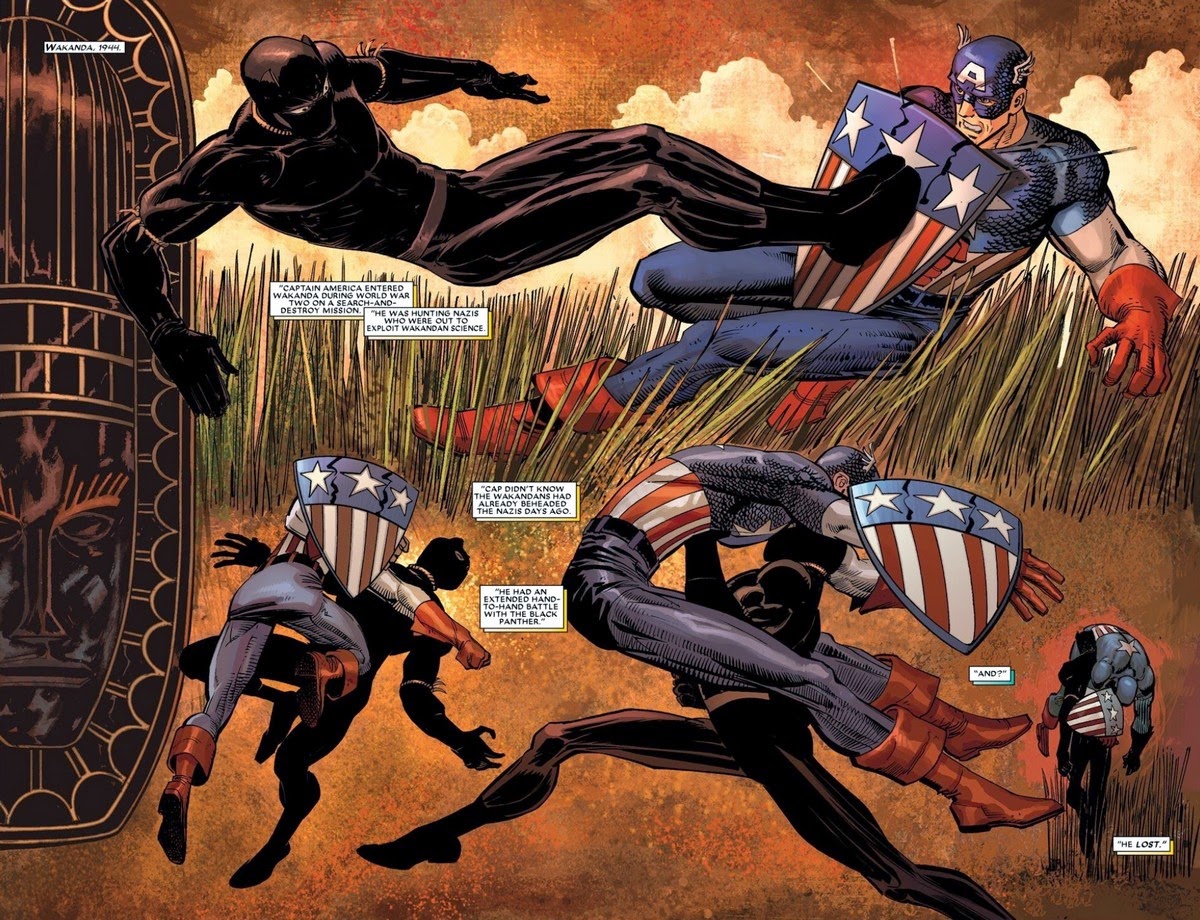
As for has to Reynolds he has differeing challenges with Miles being a relatively new character unbound from years of canon. With his novel Reynolds had to get in and get out with his story and not rely on over arching stories that can play out in comics, “you don’t have the longer three or four more issues to go before you can explain it”. With the freedom of the novel however Reynolds created an amalgam of a story based upon the Ultimate universe canon and the 616 earth timeline he’s shifted into as of late “he exist in all those spaces and that part for me was like wait wait wait…it’s like a grab bag but mad stressful.

The conversation continued a bit more on the topic of storytelling but one of the highlights, for me anyway, is the Q & A portion of the event. One question that was of interest to me was from a young lady “what do you think about your outside experiences outside politics I know Jason you slide something in there with the teacher and the politically incorrect things the treachery was doing in class with Miles but how does that inform your writing…” Reynolds respond, “I spend a lot of time with kids, I’m in spaces, I do a hundred and twenty school visits a year. I’m in front of a lot of teenagers fringing from 8 all the way up to 18…the truth is no matter what school you go to your gonna find certain students who are being mistreated and they are being mistreated for various reasons, some times that because they come from the quote unquote wrong neighborhoods or they have the wrong kinds of families… [as Miles spends] most of his life in school…I was going to spin a tale about where the evils lie. It was easiest for me to set it in that particular framework and sort of poke at the idea that there are a lot of young people who are being mistreated and that mistreatment leads to all sorts of different consequences weather it be suspension expulsion and if we were going to speak candidly…basically the book is all about school to prison pipeline. And it’s about trying to figure out is there a way for us to talk about that under the guise of Spider-man…and to show it like this isn’t as fantastic and I mean that in like terms of like fantasty this isn’t as sort of as imaginative as it seems and it’s a little more realistic than you would like to give credit to.” Summing up his answer Reynolds just wants to show more than one aspect of the Black male youth narrative, one that is beyond “he’s going somewhere he’s not like the rest of them” and what would be considered a ghetto narrative of struggle.
Coates response centered on publishers being in a constant state of fear and how even against the political nature of comics, they accuse him of putting politics in books. For Coates and his time at Marvel comics he doesn’t see his work as politicizing comics. For him the comics are already there with Captain America – dressed head to toe in a American Flag and for his own title, “Black Panther, I mean that’s his name Black Panther, (laughing) it’s gonna be political. I don’t know how you make it not. You gotta actually do something to not make it political, naw I mean. That would be a strange thing to do. So for me it was traditional I mean what else was it gonna be, there was no where else to go but politics. You know what I mean and that’s a central through line in almost any great sort of comic book I love.”
The next question comes from a performing arts teacher in search advice in ways to create a space for her students to express who the are and tell their own stores. Coates laughing says he wasn’t the best student and turns to Reyonld’s who takes a moment and responds to the audience “…everybody taking pictures of him deferring to me” we 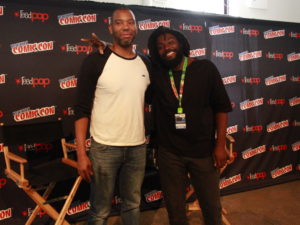 all laugh, “I think one thing I wish I was told was [that] the tricky part about language is that all of the academy will tell you that the language that is most familiar to you is improper. And its something really complicated about this right it doesn’t mean there shouldn’t be a quote unquote standard but I think what happens when we are teaching this standard we often teach while also invalidating the language that seems and comes natural to them, the language of their families the language of their communities this sort of thing that feels natural in my mouth.” “so one thing I wish I was told was that it was valid and it was valuable that they way I wanted to put it on the page. I love love love, We Real Cool (1959, Gwendolyn Brooks), there’s this recent thing that been circulating around the internet and it like Gwendolyn Brooks at sixteen and its this list she wrote when she was sixteen years old and it was like Write everyday, work on novel everyday, work on a script everyday, play music all these things she wanted to do and one of them said speak proper English and she would grow up to write We Real Cool. Somewhere along the line she had to dismantle the rule , it was like yeah I have to learn the rule so I can break the rule because there is freedom in the breaking of the thing. So when you think of Gwendolyn Brooks and you think of speak proper English its what she was telling herself to practicing everyday and she grew up to write We Real Cool which feels so normal to me so natural there is power in that. For the young people in the back…be not afraid to get loose with it. ”
all laugh, “I think one thing I wish I was told was [that] the tricky part about language is that all of the academy will tell you that the language that is most familiar to you is improper. And its something really complicated about this right it doesn’t mean there shouldn’t be a quote unquote standard but I think what happens when we are teaching this standard we often teach while also invalidating the language that seems and comes natural to them, the language of their families the language of their communities this sort of thing that feels natural in my mouth.” “so one thing I wish I was told was that it was valid and it was valuable that they way I wanted to put it on the page. I love love love, We Real Cool (1959, Gwendolyn Brooks), there’s this recent thing that been circulating around the internet and it like Gwendolyn Brooks at sixteen and its this list she wrote when she was sixteen years old and it was like Write everyday, work on novel everyday, work on a script everyday, play music all these things she wanted to do and one of them said speak proper English and she would grow up to write We Real Cool. Somewhere along the line she had to dismantle the rule , it was like yeah I have to learn the rule so I can break the rule because there is freedom in the breaking of the thing. So when you think of Gwendolyn Brooks and you think of speak proper English its what she was telling herself to practicing everyday and she grew up to write We Real Cool which feels so normal to me so natural there is power in that. For the young people in the back…be not afraid to get loose with it. ”
There were a few more questions but that last one resonated with me the most as it speaks to me about these creators and their presence surrounding representation on only on the page but behind the page. They, like this panel’s location, were just outside of the centralized normative story telling of cis-white male hero tropes. They were sitting in the sun breathing fresh air of writing from a different perspective, that is not to say they are the end of the exploitative journey creators from different walks of life but its nice to see comic aren’t bound to be stuck in the basement of a musty old building weather it the Javits center or your local comic book shop.
Kaos Blac

